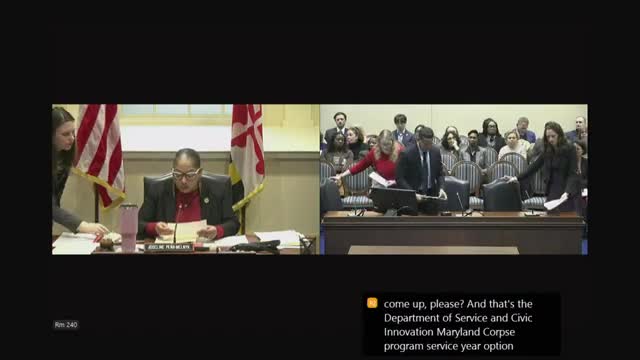Department seeks operational updates to Maryland service-year program, including expanded eligibility and fund consolidation
Get AI-powered insights, summaries, and transcripts
Subscribe
Summary
The Department of Service and Civic Innovation asked the Health and Government Operations Committee to approve technical, cost-neutral changes in House Bill 33: raise the young-adult eligibility, consolidate two program funds, update wages for local jurisdictions, and remove an inoperable Maryland 529 deposit option.
House Bill 33, offered by the Maryland Department of Service and Civic Innovation (DSCI), would make operational changes to the SERVE Act programs known as the Maryland Service Year and the Young Adult Service Year Option Pathway.
Secretary Paul Montero, Deputy Secretary Sarah Flaman and other department staff told the Health and Government Operations Committee the bill is the department's first substantive update since its creation in April 2023 and is intended to be cost-neutral. The department said the changes would streamline administration while expanding access for participants.
Key provisions and context: DSCI asked the committee to: - Expand the age eligibility window for the young-adult service-year option pathway from a floor that had been interpreted as 18–21 to a proposed 18–24 range, aligning the program with other efforts targeting opportunity youth. - Consolidate two separate program funds (the Maryland Service Year Option Pathway Fund and the Young Adult Service Year Option Pathway Fund) into a single program fund to increase flexibility in spending between pathways without seeking additional general funds. - Adjust statutory wage language so that the program floor respects higher local jurisdiction minimum wages where applicable, ensuring participants are not disadvantaged in higher-paying locales. - Remove the statutory requirement that the $6,000 completion award be payable only via a Maryland 529 plan option; DSCI explained Maryland 529 requires deposits be made by account owners with after-tax dollars and that the statutory deposit option proved operationally unworkable. The department said it will continue to help members open 529 accounts as an option.
Program metrics cited in testimony: The department said more than 200 members completed the inaugural class and received a $6,000 completion award; 170+ participants earned U.S. Department of Labor apprenticeship credentials and over 42,000 hours of technical training. The second cohort launched September 11 at the University of Maryland College Park with nearly 600 members representing every Maryland county and Baltimore City and serving at nearly 200 host sites.
Deputy Secretary Flaman told the committee the consolidation is intended to reduce administrative burden and allow DSCI to allocate funds more efficiently; the department's fiscal note indicates the change is cost-neutral in operation though it may reduce general-fund transactions by allowing combined-pathway resources to be used across streams.
Committee members asked for enrollment detail and geographic breakdowns; DSCI said it can provide zip-code-level data and noted class three recruitment will open next month.
The department urged a favorable report on HB 33; the hearing closed after committee questions and a brief recess.
Provenance: Testimony introducing HB 33 begins with the committee calling the departmental panel (block starting at 435.87) and the department's lead testimony began at 470.56 (Secretary Paul Montero). The department's concluding remarks and closure of the hearing occurred at 1286.65.
